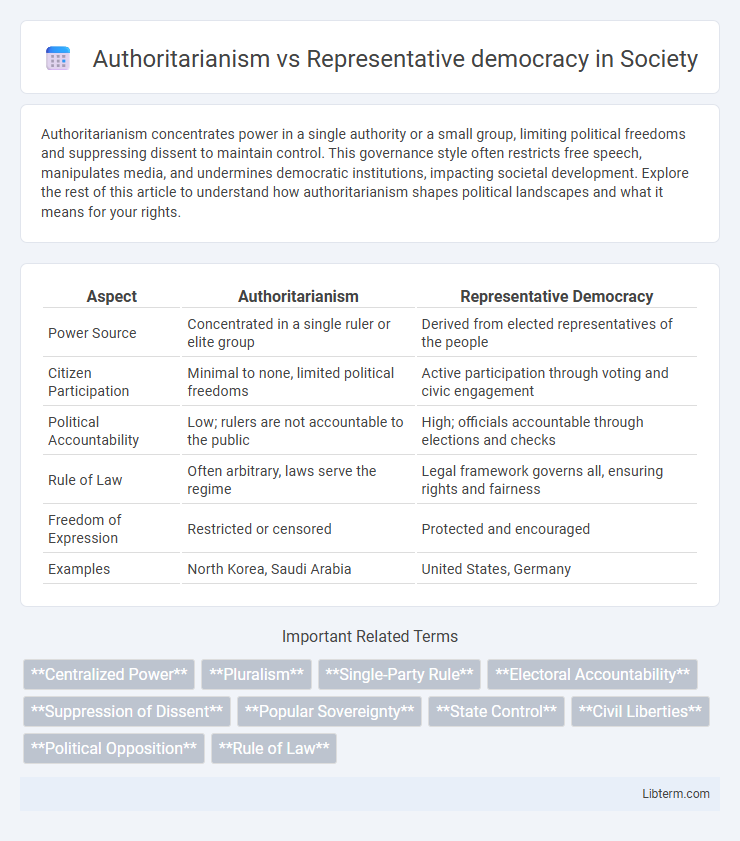Authoritarianism concentrates power in a single authority or a small group, limiting political freedoms and suppressing dissent to maintain control. This governance style often restricts free speech, manipulates media, and undermines democratic institutions, impacting societal development. Explore the rest of this article to understand how authoritarianism shapes political landscapes and what it means for your rights.
Table of Comparison
| Aspect | Authoritarianism | Representative Democracy |
|---|---|---|
| Power Source | Concentrated in a single ruler or elite group | Derived from elected representatives of the people |
| Citizen Participation | Minimal to none, limited political freedoms | Active participation through voting and civic engagement |
| Political Accountability | Low; rulers are not accountable to the public | High; officials accountable through elections and checks |
| Rule of Law | Often arbitrary, laws serve the regime | Legal framework governs all, ensuring rights and fairness |
| Freedom of Expression | Restricted or censored | Protected and encouraged |
| Examples | North Korea, Saudi Arabia | United States, Germany |
Defining Authoritarianism and Representative Democracy
Authoritarianism is a political system characterized by concentrated power in a single leader or a small elite not constitutionally responsible to the public, often marked by limited political pluralism and restricted civil liberties. Representative democracy involves elected officials who make decisions on behalf of the people, ensuring accountability through regular, free, and fair elections and protection of individual rights. The contrast lies in authoritarianism's centralization of control versus representative democracy's emphasis on participation, transparency, and rule of law.
Historical Origins and Evolution
Authoritarianism traces its origins to ancient regimes where power was concentrated in the hands of rulers like pharaohs, emperors, and monarchs, maintaining control through centralized authority without popular consent. Representative democracy evolved from classical Athenian democracy, gaining momentum during the Enlightenment with philosophers like John Locke advocating for governance based on individual rights and popular sovereignty. Over centuries, representative democracy expanded globally, institutionalizing mechanisms such as free elections and separation of powers, contrasting sharply with authoritarian systems' reliance on coercion and limited political pluralism.
Core Principles and Values
Authoritarianism centralizes power in a single leader or ruling elite, suppressing political pluralism, individual freedoms, and dissent to maintain control. Representative democracy emphasizes popular sovereignty, political equality, and protection of civil liberties by electing officials who reflect the electorate's diverse interests. Core values of authoritarianism prioritize stability and order over participation, whereas representative democracy champions transparency, accountability, and inclusiveness in governance.
Governance Structure and Power Distribution
Authoritarianism centralizes power in a single ruler or elite group, limiting political pluralism and citizen participation in governance decisions. Representative democracy disperses authority through elected officials who are accountable to the electorate, ensuring checks and balances within government branches. Governance in representative democracy promotes transparency and power-sharing, contrasting with the hierarchical and concentrated control structure of authoritarian regimes.
Citizen Participation and Political Freedom
Authoritarianism restricts citizen participation by concentrating power in the hands of a single leader or a small group, limiting political freedom through censorship and repression. Representative democracy enhances citizen participation by allowing individuals to elect officials who reflect their interests, promoting political freedom through guaranteed civil liberties such as free speech and assembly. The degree of political freedom in a system directly affects the level of meaningful citizen engagement and influence over governance.
Rule of Law and Human Rights
Authoritarianism often undermines the rule of law by concentrating power in the hands of a few, resulting in arbitrary governance and limited accountability, which frequently leads to widespread human rights violations. Representative democracy upholds the rule of law through institutional checks and balances, ensuring legal frameworks protect individual rights and promote political participation. The protection of human rights is intrinsically linked to democratic governance, where transparent legal processes and citizen oversight prevent abuses of power.
Economic Policy and Development
Authoritarianism often centralizes economic decision-making, enabling rapid implementation of large-scale infrastructure projects and state-controlled industrial policies that can drive short-term growth but risk inefficiencies and corruption. Representative democracy encourages diverse stakeholder participation in economic policy formulation, promoting transparency and accountability, though the legislative process may slow decision-making and complicate long-term development strategies. Studies show that democratic systems tend to foster sustainable development through inclusive policies and innovation, while authoritarian regimes may achieve quick economic gains at the expense of political freedoms and market flexibility.
Media Control and Freedom of Expression
Authoritarian regimes maintain strict media control through censorship, state ownership, and suppression of dissenting voices, severely limiting freedom of expression. In contrast, representative democracies guarantee press independence and protect individuals' rights to express diverse opinions, fostering robust public discourse. Media pluralism and legal safeguards in democratic systems ensure transparency and accountability, counterbalancing potential government overreach.
Stability, Security, and Social Order
Authoritarianism often prioritizes stability and security through centralized power and strict control, reducing political pluralism to maintain social order. Representative democracy promotes stability by allowing diverse voices in decision-making, fostering social cohesion through accountability and rule of law. Both systems aim for social order, but authoritarianism enforces it through top-down mandates, while representative democracy relies on citizen participation and institutional checks.
Global Trends and Future Outlook
Authoritarianism remains prevalent in regions such as Eastern Europe, Central Asia, and parts of Africa, driven by centralized power and limited political freedoms. In contrast, representative democracy is experiencing challenges from populist movements and digital misinformation but continues to dominate in North America, Western Europe, and parts of Latin America. Global trends indicate a cautious shift toward hybrid regimes, with future outlooks emphasizing the need for robust institutions and civic engagement to sustain democratic governance.
Authoritarianism Infographic

 libterm.com
libterm.com